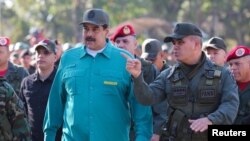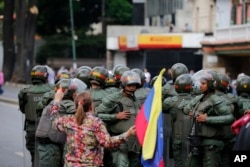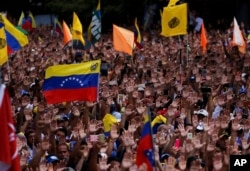The sanctions imposed on Venezuela's state-owned oil firm Monday by the United States have the potential to change the power dynamic in the standoff between Venezuelan President Nicolas Maduro, whose election is disputed by the U.S., and opposition leader Juan Guaido who has declared himself president, say analysts.
U.S. National Security Adviser John Bolton said Monday the sanctions against Venezuela's state-owned oil firm PDVSA were imposed to ensure Maduro and his allies could "no longer loot the assets of the Venezuelan people."
But the U.S. targeting of Venezuela's state-owned energy company has a clear surgical purpose — to shift control of the country's oil wealth to Guaido, thereby depriving the disputed president of the funds he needs to cling to power as popular protests against his rule mount. And in particular to stop Maduro from being able to pay his army, say U.S. officials.
Guaido, who declared himself interim president last week, has called on his supporters to stage more protests on Wednesday. He has not only earned a U.S. endorsement — his attempt to oust Maduro and call new elections is also approved also by more than a dozen Latin American countries, including Venezuela's neighbor, as well as European nations and Canada.
But forcing Maduro out remains a huge task for the 35-year-old Guaido, chairman of the country's national assembly, and it is unlikely to be achieved without more violent chaos, say analysts. Maduro has retained the loyalty of army leaders. Their fidelity has been bought with kickbacks and sweetheart deals by Maduro using Venezuela's oil revenue.
When Maduro's socialist predecessor, Hugo Chavez, came to power he purged the ranks of the military, appointing senior figures aligned with his left-wing ideals to the top posts. Maduro has piled on the rewards since then.
"The calculation of the opposition and its foreign allies appears to be that by claiming the interim presidency, demonstrating massive popular support across the country and among all sectors of society including from former government loyalists enraged by hyper-inflation and food scarcity and obtaining powerful international backing, Guaido will force a split in either the Maduro government or, perhaps more critically, the armed forces," according to Phil Gunson, an analyst at the International Crisis Group, a Brussels-based research organization.
"If elements of the military with sufficient firepower were to break with Maduro, they could force him from power," he says.
So far there are no signs the army is about to break with the disputed leader — only the country's military attache in Washington has defected. Guaido has sought to try not to box in the military high command, by promising the generals immunity from future corruption prosecutions.
The sanctions announced by the U.S. Monday are seen by many as a possible game changer. Influential analysts had warned the Trump administration beforehand against imposing a full-blown oil embargo on the impoverished and strife-torn country, fearing that might play into Maduro's hands.
The fear was that he would be able to accuse Washington of aggression and of worsening the woes of ordinary Venezuelans, who are already contending with hyper-inflation, the collapse of the country's medical system and dire food shortages, all the consequences of Maduro's economic mismanagement. Maduro blames Venezuela's economic plight on the U.S.
Moises Rendon of the Center for Strategic and International Studies, a Washington-based think tank, was among the analysts cautioning the Trump administration against announcing an oil embargo.
"An oil embargo would be counterproductive and could undermine Guaido's leadership within the country," Gunson said.
Instead Monday's sanctions will redirect oil payments and contracts to Guaido's administration and the National Assembly, along with $20 million in U.S. humanitarian aid earmarked for Venezuela. Most of the aid will likely be directed through the National Assembly and civil society organizations and the Catholic Church with the help of the Venezuelan diaspora.
"Right now Maduro has the power, but he doesn't have the legitimacy. Guaido has the legitimacy, but he doesn't have the power. This is the situation in which Venezuela is in today. It is an incredibly precarious situation," said Jason Marczak, an analyst with the Washington-based policy research organization the Atlantic Council.
How the standoff plays out remains unclear. U.S. officials say they fear Maduro will opt to intensify his efforts to repress the protests against his government and could decide to arrest Guaido and other members of the National Assembly leadership. They have tried to head off that possibility by issuing clear warnings to Maduro, including by refusing to rule out a military intervention.
The threat of a military option prompted Venezuelan ambassador to the United Nations, Jorge Valero, to accuse the U.S. administration Monday of preparing a "military invasion." Hours earlier, Trump's national security adviser added to speculation about an intervention by flashing around a note with the words "5,000 troops to Colombia" written on it.
Analysts suspect that was an effort by Bolton to intimidate, a bid to frighten Maduro from ordering a widespread crackdown. Bluff can have a role in trying to shift the power dynamic too, they say.
"The question is what will soldiers do when they see Option A: stick on with Maduro, repress Venezuelans, and incite violence or Option B: side with the Guaido government which can attract a huge influx of humanitarian assistance for them and their families. That could potentially change the calculus in some people's minds," according to the Atlantic Council's Marczak.









